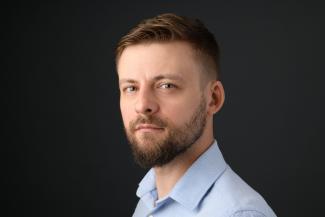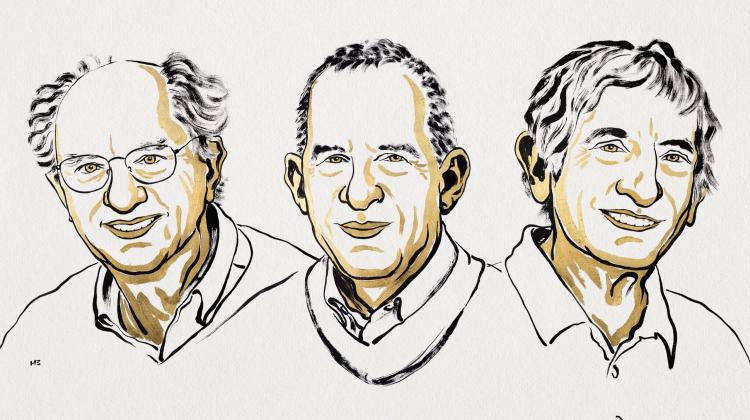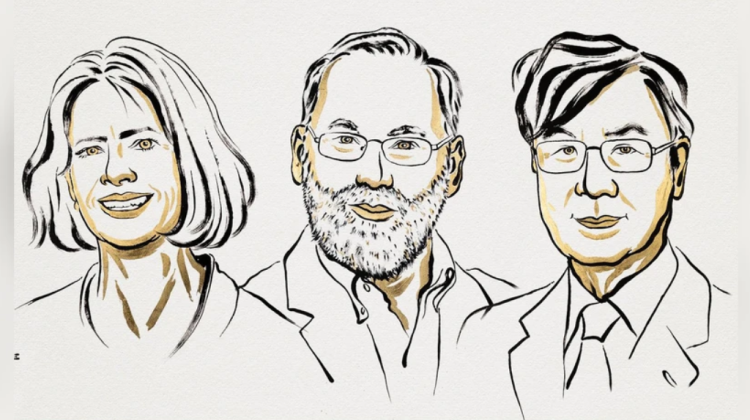Emmanuelle Charpentier and Jennifer Doudna are winners of this year's Nobel Prize in Chemistry. They were honoured for the ground-breaking discovery of the CRISPR-Cas9 system, now widely used as a genomic editing tool that has revolutionized medicine. After the decision of the Nobel Committee had been announced, Charpentier noted that this success was possible thanks to, inter alia, dr. Krzysztof Chyliński, co-discoverer of the family of patents describing the use of CRISPR / Cas9.
In 2008 you receive your TUL diploma, in 2012 a ground-breaking article is published in "Science", of which you are the first co-author. Ground-breaking, because you describe how to use CRISPR type II as a genome editing tool, which, as it will turn out eight years later, will become the basis for the Nobel Prize. When did you become interested in the system of defence of bacterial organisms?
This research was the subject of my doctorate. Emmanuelle group has been working on CRISPR for some time and I joined the project. The mechanism was fascinating to me from the start. The very idea of the immunity system acquired in bacteria was new and very interesting. The possibility to work on a completely new mechanism is an amazing privilege. The scientific projects often concern detailed characterization of small fragments of mechanisms or cellular processes, and we had the opportunity to describe something completely new - a new protein, a new family of non-coding RNAs. Initially, our interest was in describing CRISPR type II in bacteria, it was basic research aimed at understanding the biological process and then the differentiation and evolution of these mechanisms. This work continues, but CRISPR has gained fame by using CRISPR/Cas9 and related genome editing tools. Today hundreds of laboratories are working to improve CRISPR/Cas9 and thousands are using it as a tool. Our publication has nearly 10,000 citations, and the technology has won dozens of awards.
What specific area of this research were you involved in?
After completing my doctorate, I started to apply and improve the system. I created and supervised the service and research unit at Vienna BioCenter Core Facilities in Vienna. There we used CRISPR/Cas9 mainly to create mobile models for other researchers. We cooperated and supported dozens of laboratories, mainly from Vienna, but also from outside Austria.
In the comments about this year's Nobel Prize we read that "gene scissors" were appreciated in the progress of medicine. Under what circumstances and when will patients benefit from your discovery?
You have to look at two main aspects of this technology and its use in the advancement of medicine. On the one hand, we have basic research, characterizing e.g. diseases or tests of drugs and therapies on e.g. cell models. In both cases, genetic engineering is used to create models of diseases or research on the function of given genes and the consequences of their mutation. CRISPR/Cas9 is already in widespread use in these cases, helping to facilitate and speed up research. On the other hand, we have proposals for specific therapies using CRISPR/Cas9. Clinical tests of anticancer therapies and selected genetic diseases, e.g. sickle cell anaemia, are ongoing. As with any new drug, however, this means years of further research and testing before the potential therapy becomes publicly available.
Emmanuelle Charpentier thanked you for your "significant contribution to the decoding of CRISPR-Cas9 in bacteria". What does a scientist feel at such an important moment - on the one hand, the field you deal with has been awarded the most prestigious prize, on the other hand, the non-scientific world has learned your name?
Satisfaction, joy, pride, disbelief... CRISPR/Cas9 has already won worldwide recognition and many awards, including the Breakthrough Prize, the Breakthrough of the Year Award of "Science" magazine, the Gairdner International Award, the Tang Prize and the Japan Prize. Each of them was a source of pride and happiness. My name had already appeared through the context of this discovery, though rather abroad. Not much was said about it in Poland, but e.g. Grzegorz Lindenberg described the history of the discovery and my participation in his book "Improved Humanity". It is nice to be appreciated, and in recent days I have heard from many colleagues and acquaintances, still from my student days, with whom I have not heard from for a long time.
Could you tell us more about the cooperation with the Nobel Prize winners?
Working in such a popular and competitive field is hard and demanding. Now dozens of laboratories are working on improving the method, and thousands use it every day. New applications appear almost every week. It seems that the only limit is the imagination and ingenuity of scientists. What was very important for me in cooperation with Nobel Prize winners is their openness. On the one hand, openness to other people and their opinion, because we could always talk about science and work honestly as well as equals, criticizing and discussing in an atmosphere of mutual respect. On the other hand, openness to new possibilities - when an experiment brought something interesting, unexpected, we were free to follow it.
Why is it worth being a scientist?
It is worth being a scientist if you want to be a scientist. It is hard work that requires true passion and persistence. If you feel this "vocation", it is worth following it and giving it a try. Science opens many new paths and allows you to find fulfilment in research, teaching, work in industry, medicine, publishing, journalism, popularization ... There are many possibilities and paths, it is worth taking this first step. I was very lucky on my way. Today, when I read that someone somewhere in the world is receiving an experimental drug based on CRISPR / Cas9 and I know that my work has helped to accomplish this; it gives me tremendous satisfaction. It's hard to imagine a better reward. That is why it is worth it.





